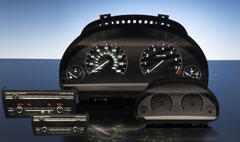May 6 2009
The demand by motorists for increasing sophistication in their top-end cars is being met with advances in polycarbonate films in 'black panel technology' from Bayer MaterialScience.
 The multi-functional instrument panel for the cockpit and the audio/air-conditioning control systems in the instrument panel and the rear of the new BMW 7 series are designed to have a black, matt, completely homogeneous surface when the displays hidden behind them are not activated. Unlike conventional backlighting technology, even the contours of the displays do not stand out.
The multi-functional instrument panel for the cockpit and the audio/air-conditioning control systems in the instrument panel and the rear of the new BMW 7 series are designed to have a black, matt, completely homogeneous surface when the displays hidden behind them are not activated. Unlike conventional backlighting technology, even the contours of the displays do not stand out.
A further milestone in this technology has been achieved through collaboration between Bayer MaterialScience and the BMW Group, together with a number of partners, an advance that can be seen in the latest BMW 7 Series.
The clever feature about this 'black panel technology' is that the car's displays and controls are visible only when needed by the driver. And it is based, among other things, on surfaces made of Marnot polycarbonate films from Leverkusen-based Baver MaterialScience.
The multi-functional instrument panel for the cockpit and the audio/air-conditioning control systems in the instrument panel and the rear are designed to have a black, matt, completely homogeneous surface when the displays hidden behind them are not activated. Unlike conventional backlighting technology, even the contours of the displays do not stand out. As a result, the interior of the BMW 7 Series exudes a feeling of clarity, elegant functionality and familiarity.
"We were commissioned to provide matt polycarbonate films with a precisely defined transmission within minimum tolerances," says Roland Künzel, a films specialist at Bayer MaterialScience. The films also had to have antireflective surfaces to ensure good legibility of the displays and backlit symbols, while delivering excellent abrasion and scratch resistance.
The large-format multi-functional instrument panel is covered with a thin light-transmitting sheet made of Marnot XL GU 90. It is produced by BÖ-LA Siebdruck- und Kunststofftechnik GmbH based in Radevormwald, Germany, and fitted with a removable protective film. "The sheet is a precision optical element for a component that ensures optimum driving safety. One of the key areas of our expertise lies in punching films extremely carefully and precisely, without impairing the surface quality of these comparatively large sheets," says Mike Böing-Messing, CEO of BÖ-LA. Robert Bosch GmbH from Leonberg near Stuttgart was the developer and system supplier for the entire multi-functional instrument panel.
A control system in the instrument panel, which is known as the centre stack and incorporates the radio and air conditioning functions, carries the design of the multi-functional instrument panel to the interior. The surface of the centre stack is made of Marnot XL GU 130 and is produced by Albea Kunststofftechnik GmbH using the film insert moulding (FIM) process. "One challenge that we faced was ensuring the flawless back injection of the film inserts and the careful handling of the complex 3D components while maintaining a high level of automation," says Iris Bösch, head of project management at Albea. The developer and system supplier for the entire centre stack was Preh GmbH from Bad Neustadt a. d. Saale, Germany.